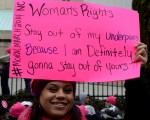It’s kind of funny how angry people get over the thought of subsidized tampons. But sometimes, it’s just sad.
Through personal day-to-day experiences, my internship with Planned Parenthood Los Angeles and the reactions to my blogs about feminine health care and equality this summer, I have definitely learned that the topic of feminine health care is a polarizing one.
This summer, I explored the idea of gender equality by blogging about government-subsidized tampons, equality and the controversy surrounding Planned Parenthood’s sale of fetal tissue for scientific research. These aren’t just female issues and they are not going to miraculously disappear or go away anytime soon.
In response, dozens of people who read my blogs felt compelled to comment that the changes and protections I believe are essential to women’s health care are unnecessary entitlements. Most of their comments did not take the time to explain why, but instead ridiculed me for my opinion that we could be doing more to promote gender equality in health care.
Health care equality is a serious issue that affects everybody, regardless of identity, marital status or the current president.
The absence of a conversation among young people about attainable health care and what that health care entails adds to the problem of negative discourse. Without dialogue that respects feminine health care needs, women will continue to be put at a disadvantage everywhere they go.
Even though feminine health care is a simple and day-to-day topic, it has failed to become a part of a prevalent discussion on campus.
At UCLA, students should be having these discussions to determine the best way for our administration and student government to serve female students – whether we as a student body decide that’s for the Arthur Ashe Student Health and Wellness Center to begin offering free tampons or the undergraduate student government Student Wellness Commission to include the promotion of women’s health within the coverage of its numerous awareness weeks.
No matter what your belief is, menstrual cycles are still going to happen, and there will be unwanted or unsafe pregnancies. If periods and other seemingly awkward subjects continue to be treated as taboo by younger generations, where can we expect change to start?
The criticism and opinions I received since my first blog post about subsidized tampons was published were not necessarily invalid, but their discourse failed to present arguments. Creating a vicious environment during any sort of discussion usually doesn’t lead to the idea being discussed further, and definitely doesn’t lead to any positive changes.
There is no reason for health care to remain such a polarizing topic, but because of this stigma surrounding feminine health care, women’s health care is given little room for progress and no serious discussion. Most of the criticism I received for my blogs was from middle-aged, mostly male people who are already set in their ways and ideas.
College students are constantly told that we are the face of change, and this is true. But unless we actively decide to change the dialogue surrounding women instead of dismissing the current state of affairs as ‘good enough,’ we might find ourselves turning into another generation of people who are similarly resistant to change.
As we try to tackle the larger and more daunting social issues of this world, we can’t forget the smaller but still meaningful issues in between. Although feminine health care may not seem important, it is. And the change can start by creating space for discussions and ideas on how to improve health care and access to sanitary products for all women.
This is where young people can enter the conversation and turn it into a discussion, and then into action to make changes.
Gender equality in health care is not a political issue, it is a human one. And it’s about time we started treating it that way.

Women’s health care is not a polarizing issue. What is a polarizing issue is what to do with opinions from young college students that include suggesting that the government should be so uninvolved in women’s underpants that it should pay for tampons. The reaction to your puzzling tirades have never been about women’s equality, but rather about the urge to ridicule breathtakingly bad ideas.
http://www.aol.com/article/2015/09/22/13-year-old-girl-dies-from-bacterial-infection-linked-to-tampons/21239449/
Michelle
TESTIMONY ON HOW I GOT MY LOAN MIRACULOUSLY FROM UNITED LOAN COMPANY company Number: +13816450771
Hello Everyone, I Michelle a single mom from dudelange in Luxemburg, i will like to share this great testimony on how i
got my loan from United Loan Company when we were driven out of our home when i couldn’t pay my bills any more,
After been scammed by various companies on line and have been denied a loan by my bank and some other credit union i
visited. my children were taken by the foster care, i was all alone in the street. Until a day i shamefully walked into an
old school mate who introduced me to United Loan Company At first i told her that i am not ready to take any risk
of requesting a loan on line any more, but she assured me that i will received my loan from them. On a second thought, due
to my homelessness i took a trial and applied for the loan, luckily for me i received a loan of $50,000.00 from
(united_loan@outlook.com). Am happy i took the risk and applied for the loan. my kids have been given back to
me and now i own a home and a business of my own. All gratitude goes to United Loan Company for giving a meaning
to my life when i had lost all hope.
Contact Email Address: united_loan@outlook.com
Michelle Will